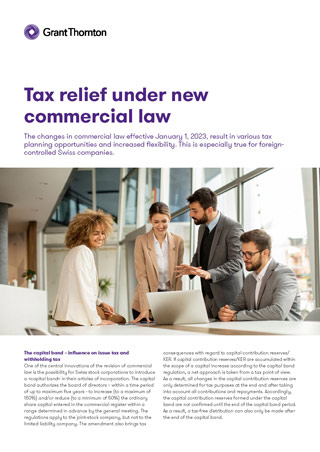-
Audit Financial Services
More security, more trust: Audit services for banks and other financial companies
-
Audit Industry, Services, Institutions
More security, more trust: Audit services for national and international business clients
-
Corporate Tax
National and international tax consulting and planning
-
Individual Tax
Individual Tax
-
Indirect Tax/VAT
Our services in the area of value-added tax
-
Transfer Pricing
Our transfer pricing services.
-
M&A Tax
Advice throughout the transaction and deal cycle
-
Tax Financial Services
Our tax services for financial service providers.
-
Financial Services
Consultancy services that generate real added value for financial service providers.
-
Advisory IT & Digitalisation
Generating security with IT.
-
Forensic Services
Nowadays, the investigation of criminal offences in companies increasingly involves digital data and entire IT systems.
-
Regulatory & Compliance Financial Services
Advisory services in the area of financial market law.
-
Transaction Services / Merger & Acquisition
Successfully handling transactions with good advice.
-
Legal Services
Experts in commercial law.
-
Trust Services
We are there for you.
-
Business Risk Services
Sustainable growth for your company.
-
Abacus
Grant Thornton Switzerland Liechtenstein has been an official sales partner of Abacus Business Software since 2020.
-
Accounting Services
We keep accounts for you.
-
Payroll Services
Leave your payroll accounting to us.
-
Real Estate Management
Leave the management of your real estate to us.
-
Apprentices
Career with an apprenticeship?!

The capital band – influence on issue tax and withholding tax
One of the central innovations of the revision of commercial law is the possibility for Swiss stock corporations to introduce a «capital band» in their articles of incorporation. The capital band authorizes the board of directors – within a time period of up to maximum five years - to increase (to a maximum of 150%) and/or reduce (to a minimum of 50%) the ordinary share capital entered in the commercial register within a range determined in advance by the general meeting. The regulations apply to the joint-stock company, but not to the limited liability company. The amendment also brings tax consequences with regard to capital contribution reserves/KER. If capital contribution reserves/KER are accumulated within the scope of a capital increase according to the capital band regulation, a net approach is taken from a tax point of view. As a result, all changes in the capital contribution reserves are only determined for tax purposes at the end and after taking into account all contributions and repayments. Accordingly, the capital contribution reserves formed under the capital band are not confirmed until the end of the capital band period. As a result, a tax-free distribution can also only be made after the end of the capital band.
The net approach is applied not only with regard to the change in capital contribution reserves, but also with regard to the issue stamp tax under capital band rules. The issue stamp tax is only due if the inflows made within the scope of the capital band exceed any repayments. Consequently, the stamp tax is only settled at the end and not already at the time of a capital increase, during the term.
Financial statements in foreign currency
As of January 1, 2023, the share capital of an AG or the share capital of a GmbH can now be entered in the commercial register in foreign currency, but the minimum capital at the time of incorporation must be equivalent to CHF 100’000 or CHF 20’000, respectively. Accordingly, bookkeeping and accounting can be done in functional and thus in the currency relevant for the company. Currently, EUR, USD, GBP or JPY are recognized as eligible functional year-end currencies.
If the transaction is denominated in a foreign currency, the taxable net profit must be converted into Swiss francs for tax purposes. The average exchange rate for the tax period is decisive. For the conversion of the taxable equity, the exchange rate at the end of the tax period is relevant. In the tax return, these tax factors continue to be declared in Swiss francs.
The option of preparing financial statements in functional currency simplifies tax processes. Currency-related translation differences, which previously had to be deferred for tax purposes, no longer apply, and the discussion points about the amount of existing KER in CHF vs. functional currency become obsolete. This is particularly advantageous for foreign investors with group companies in Switzerland.
Existing companies can also benefit from the new regulation and may decide to use their functional currency EUR, USD, GBP or JPY as the presentation currency for the financial statements. In this constellation, from a legal point of view, a resolution of the general meeting as well as a corresponding amendment of the articles of association are necessary. From a tax point of view, in the event of such a change in the relevant presentation currency, relevant tax attributes such as KER balance, loss carryforwards, investment base amounts, etc. must be clarified or fixed in a binding manner.
Swiss taxes remain payable in CHF even in the case of annual financial statements presented in foreign currency; there is no change in this respect.
Interim dividends
Current law does not provide a basis for the payment of an interim dividend. With the revision of commercial law, this is now anchored in the law. In the future, the General Meeting of Shareholders may, based on interim financial statements, resolve to pay an interim dividend from the profits of the current financial year. From the point of view of Swiss income and withholding taxes, interim dividends are to be treated in the same way as ordinary dividends. The new regulation allows a situational and timely distribution of dividends and fulfills a long-standing demand for greater flexibility analogous to foreign regulations.
Assessment of the new tax opportunities
The regulation of the annual financial statements in functional currency reduces the tax complexity of foreign direct investments in Switzerland and can be of decisive advantage for foreign-controlled corporations in Switzerland. For existing companies that decide to opt for a voluntary change of the annual financial statement presentation to functional currency, it is decisive to fix the tax attributes to avoid taxation surprises. Interim dividends increase the flexibility of distributions, this can be advantageous. The capital band will likely be of relevance only for top-tier Swiss parent companies, especially for listed companies.
Grant Thornton Switzerland/Liechtenstein will be happy to assist you with these or other tax-related questions. We look forward to hearing from you.


